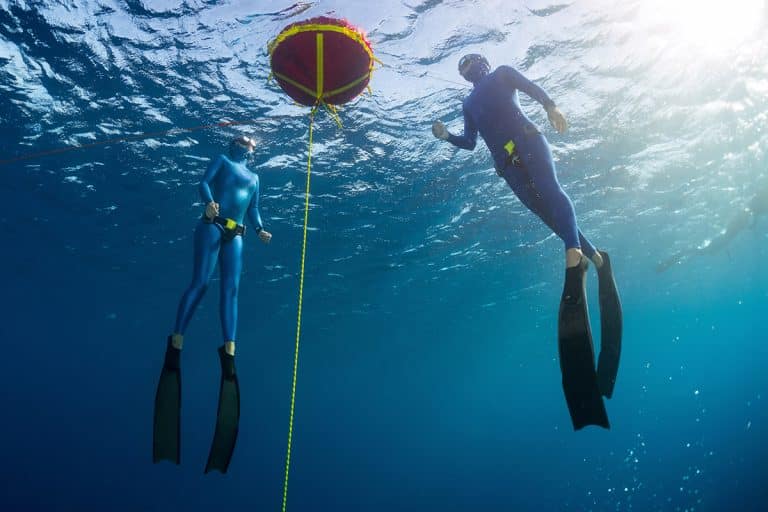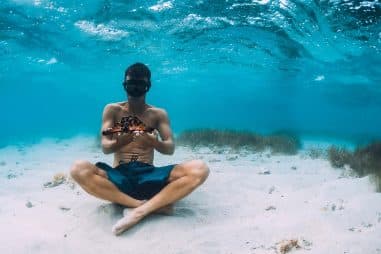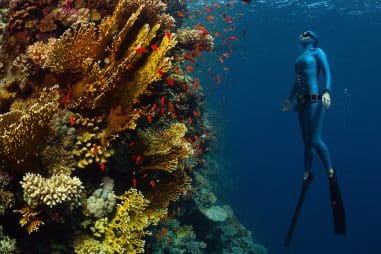Freediving (also known as free-diving, free diving, skin diving, or breath-hold diving) is an underwater sport where you swim into deep waters in a single breath and without any breathing apparatus.
It might look elegant in photos and videos, but it’s not as easy as it seems. The sport requires physical and psychological skills and discipline.
To ensure that you are fit (physically and mentally) to freedive, you would need to go into a three-part training that includes knowledge development, pool training, and open water dives.
You have to be comfortable enough to swim several meters with no pre-existing conditions before you can venture out into the dangerous (albeit fascinating) world of freediving.
Why is Freediving So Dangerous?
In freediving, drowning is always a risk as there is a lack of access to air for breathing. Drowning can result in asphyxia if you fail to reach the surface before you ran out of breath.
Apart from that, the ocean can be a mean playground as it exerts extreme pressure on your lungs as you descend.
Can You Die From Freediving?
The short answer is yes, you can die from freediving. All dives are different, the ocean can be very unpredictable, and your life depends on just one breath.
This is why you would need proper training and you would need to always dive with a friend to make sure that your safety is closely monitored.
How Why Do Freedivers Die?
Low oxygen levels in the body may lead to death in freediving. These pose the most significant risk because you need enough oxygen flowing in your bloodstream to stay underwater safely. Enough supply oxygen in the blood also ensures that you will safely ascend and break the water’s surface.
Low oxygen levels may cause blackout or hypoxic fits that may eventually result in fatality if they aren’t treated quickly.
How Many Freedivers Die Each Year?
It was reported that about 100 divers die annually from freediving. However, the death toll in competitive and recreational diving is very different.
In competitive freediving, there is one death in every 50,000 competitive dives. On the other hand, recreational freediving has one death in every 500 dives.
Is Freediving Bad for Your Health?
Freediving isn’t necessarily bad for your health. On the contrary, if you do it properly and safely, the potential risks and dangers of freediving can be avoided, and it may even be beneficial for your health.
Studies show that the skills and techniques used in freediving can improve your breathing, body awareness, and lung function, and it can even reduce stress.
What Does Freediving Do to the Body?
Your body automatically adjusts when submerged in water. Your heart rate and metabolism would be reduced to slow down the use of oxygen. The body also starts diverting the flow of blood from your extremities to the vital organs.
The pressure constricts the spleen resulting in an extra supply of hemoglobin that carries oxygen around the body.
Do Freedivers Get Nitrogen Narcosis?
Freedivers do get nitrogen narcosis. Though it varies from person to person or day to day, nitrogen narcosis often occurs if you dive deeper than 85 feet or approximately 25 meters deep.
Nitrogen narcosis is caused by gases in your lungs that are likely to dissolve into your bloodstream when you take a breath of air before swimming underwater. The deeper you swim, the more nitrogen dissolves into your bloodstream, which flows into your brain, eliciting one or more of the following symptoms:
- Euphoria
- Feeling of intoxication or annoyance
- Numbness
- Tunnel Vision
- Hallucinations
- Anxiety
- Paranoia
- Disorientation
- Lack of coordination
- Reduced decision-making speed or bad-decision making
- Cold Shivers
- Confusion
- Impulsiveness
- Cognitive impairment
Can You Get the Bends From Freediving?
Although uncommon, freedivers can get the bends (also known as decompression sickness or DCS). DCS is caused by the formation of nitrogen bubbles in your body’s tissue due to sudden decompression.
As opposed to scuba divers, freedivers do not inhale pressurize air, but the last intake of breath before a dive still contains nitrogen, and this would still pressurize as you descend.
This is usually caused by the following:
- Short surface interval times – If you are freediving for long periods and in great depths, it is essential to take longer surface interval times between dives.
- Mixing scuba diving and freediving – Since both activities may result in the accumulation of nitrogen, is it is not advisable to freedive after scuba diving and vice versa.
- Physiological factors – Several factors, including your age, hydration, temperature, medications, body composition, and level of fatigue, may influence your susceptibility to get DCS.
How Do Freedivers Avoid Getting the Bends?
To prevent getting the bends or decompression sickness while freediving, you should practice the following:
- Keep each freediving sessions to 2 hours or shorter and immediately end the session if you start getting cold.
- Make sure to limit your dives to only one dive per day if you’re aiming to dive deeper than 55 meters or 180 feet.
- Keep your ascent to a normal speed of 1 meter per second or 3 feet per second.
- Do not mix freediving, scuba diving, and getting on an airplane. Make sure that you get ample time in between activities.
- Before any diving session, make sure that you are well-rested, stress-free, and free from any sickness.
- Hydrate well by drinking 1 liter of water before and after the dive and drinking plenty of water throughout the dive. Also, make sure that you haven’t consumed any alcohol the day before the dive.
What is Lung Squeeze When Freediving?
Lung barotrauma, known in the freediving world as “lung squeeze,” is a pulmonary injury caused by rapid changes in lung pressure. You may experience lung squeeze after reaching the residual volume (RV) threshold of the lungs usually beginning between 30 to 40 meters or 98 to 131 feet into your dive.
Lung squeeze can manifest as different lung conditions such as arterial gas emboli (AGE), pneumothorax, pneumomediastinum, and pneumopericardium.
Can Freediving Cause Brain Damage?
Of the risks and dangers posed by freediving, brain damage is not one of them. Your body has several defense mechanisms to ensure that your brain is protected before the occurrence of brain damage or death.
Although freediving can’t cause brain damage, severe lack of oxygen due to passing out underwater can.
Why Do Freedivers Pass Out at the Surface?
Freedivers pass out at the surface due to either blackout or hypoxic fit.
Blackout refers to the complete loss of consciousness as a result of hypoxia. If it happens underwater, it is called shallow water blackout. It can also occur on the surface of the water and even thirty seconds of poor recovery breathing. Often, blackout comes with no warning signs, and you may not even be aware that it has taken place. If you are not brought back to consciousness quickly, the blackout may result in brain damage.
Hypoxic fit is the loss of motor control in the body, ranging from subtle trembling to severe, full-body convulsion. This happens on the surface after a dive and may be followed by a recovery or a full blackout. It also comes with no warning signs.
How Do I Stop Freediving Blackouts?
Freediving blackouts are highly preventable. To ensure blackout-free dives, you should practice the following:
- Avoid hyperventilating before the dive.
- Ensure that you have sufficient recovery time between the dive
- Ensure that you are healthy and well hydrated before diving
- Ensure that you are within the limits of your abilities throughout the dive
- Always dive with a friend.
What is Considered the Safest Depth for a Freediver?
The safest depth varies from diver to diver. Beginners may be comfortable diving 5 meters to 10 meters, while more experienced divers may dive 40 feet or 12.19 meters down.
It all boils down to your experience and how comfortable you are underwater.
At What Depth is Freediving Dangerous?
The depth in which freediving becomes dangerous also varies from diver to diver or day to day. Depth is not the sole factor that can make freediving dangerous.
Experienced divers can often dive to a depth of 200 meters and surface safely the same way that a shallow dive can easily go south due to the conditions of the ocean or the health of the diver.
Is Freediving Safer Than Scuba?
Freediving is not necessarily safer than scuba diving as the two activities, although both done underwater, have stark differences. Both practices have very glaring differences. Often it is the divers who ensure the safety of either form of diving.
What is the Difference Between Freediving and Scuba Diving?
From breathing to equipment to purpose, scuba diving and freediving couldn’t be more different.
Freedivers hold their breath throughout the entire dive, while scuba divers never hold their breath underwater to avoid the overexpansion of their lungs. Because freedivers do not absorb too much nitrogen, they don’t have to worry about safe ascent rates, decompression, and making safety stops. These are necessary practices that scuba divers have to follow.
Another difference between the two is in their equipment. Freedivers may use masks, snorkel wetsuits, and fins if they want to, but they are not mandatory. Scuba divers need to be well-equiped with their tanks, regulators, masks, and fins.
Freediving and scuba diving also differ in their goals in some ways. Recreational scuba diving is usually done for leisure, but freediving offers a wider range of experiences, and it is ultimately more freeing.
Can You Freedive After Scuba Diving?
It is not advisable to freedive after scuba diving as the activity would increase the amount of nitrogen in your body. It is advisable to avoid freediving for 24 hours after scuba diving.
Can You Scuba Dive After Freediving?
Like the above, it is best not to go scuba diving after freediving. The rule of thumb is that you should avoid scuba diving for 12 hours after freediving.
Can You Fly After Freediving?
Make sure that you do not mix flying with either freediving or scuba diving. This may pose a risk as getting on a plane also put pressure on your body. You should also observe 24 hours after either activity before hopping on a plane.




